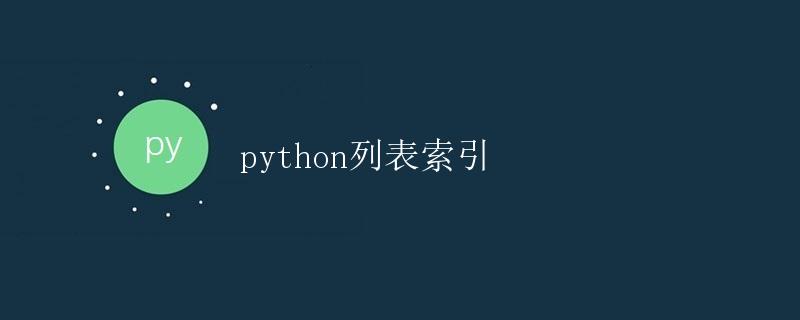python列表索引

1. 什么是列表索引?
在Python中,列表是一种有序的数据类型,可以存储不同类型的元素。列表索引允许我们根据元素在列表中的位置来访问和操作列表中的元素。索引是一种整数值,从0开始,表示元素在列表中的位置。
2. 列表的索引操作
# 创建一个列表
fruits = ['apple', 'banana', 'orange', 'grape']
# 访问单个元素
print(fruits[0]) # 输出 'apple'
print(fruits[2]) # 输出 'orange'
# 修改元素
fruits[1] = 'pear'
print(fruits) # 输出 ['apple', 'pear', 'orange', 'grape']
# 使用负数索引访问列表末尾的元素
print(fruits[-1]) # 输出 'grape'
print(fruits[-2]) # 输出 'orange'
# 输出列表的长度
print(len(fruits)) # 输出 4
3. 列表切片
除了单个索引外,还可以使用切片操作来访问列表中的多个元素。切片使用两个索引值,用冒号:分隔。第一个索引表示切片的开始位置(包含),第二个索引表示切片的结束位置(不包含)。
# 创建一个列表
numbers = [1, 2, 3, 4, 5, 6, 7, 8, 9, 10]
# 访问切片
print(numbers[2:5]) # 输出 [3, 4, 5]
print(numbers[:5]) # 输出 [1, 2, 3, 4, 5]
print(numbers[5:]) # 输出 [6, 7, 8, 9, 10]
print(numbers[:]) # 输出整个列表 [1, 2, 3, 4, 5, 6, 7, 8, 9, 10]
# 步长切片
print(numbers[::2]) # 输出 [1, 3, 5, 7, 9]
print(numbers[::-1]) # 输出 [10, 9, 8, 7, 6, 5, 4, 3, 2, 1]
# 列表拷贝
new_numbers = numbers[:]
print(new_numbers) # 输出整个列表 [1, 2, 3, 4, 5, 6, 7, 8, 9, 10]
4. 对列表进行操作
我们可以使用列表索引来对列表进行一些常见的操作,例如添加、删除、插入和替换元素。
# 创建一个空列表
colors = []
# 添加元素到列表末尾
colors.append('red')
colors.append('blue')
colors.append('yellow')
print(colors) # 输出 ['red', 'blue', 'yellow']
# 插入元素到指定位置
colors.insert(1, 'green')
print(colors) # 输出 ['red', 'green', 'blue', 'yellow']
# 删除指定位置的元素
del colors[2]
print(colors) # 输出 ['red', 'green', 'yellow']
# 删除指定值的元素
colors.remove('red')
print(colors) # 输出 ['green', 'yellow']
# 替换指定位置的元素
colors[1] = 'orange'
print(colors) # 输出 ['green', 'orange']
# 清空列表
colors.clear()
print(colors) # 输出 []
5. 列表的常见操作方法
除了上述的基本操作外,Python还提供了许多列表操作方法,下面是其中一些常见的方法。
# 创建一个列表
numbers = [1, 2, 3, 4, 5, 6, 7, 8, 9, 10]
# 判断元素是否存在
print(5 in numbers) # 输出 True
print(11 in numbers) # 输出 False
# 计算元素出现的次数
print(numbers.count(3)) # 输出 1
print(numbers.count(11)) # 输出 0
# 返回元素的索引
print(numbers.index(4)) # 输出 3
# 反向排序
numbers.reverse()
print(numbers) # 输出 [10, 9, 8, 7, 6, 5, 4, 3, 2, 1]
# 排序
numbers.sort()
print(numbers) # 输出 [1, 2, 3, 4, 5, 6, 7, 8, 9, 10]
6. 总结
列表索引和切片是Python中非常重要和有用的功能,它们允许我们对列表中的元素进行访问、修改、删除和替换。通过掌握列表索引和切片的使用,我们可以更加灵活地操作和处理列表数据,提高编程效率。
 极客教程
极客教程